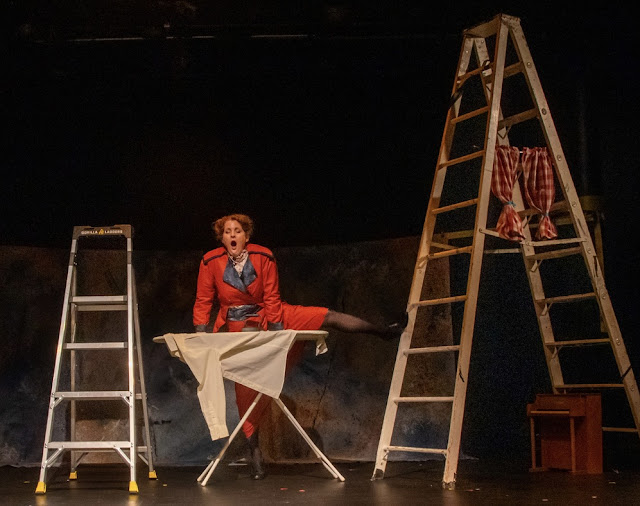gerstl took the easy way out
Written by Lydia Blaisdell
Directed by Ashley Olive Teague
154 Christopher Street, Manhattan, NYC
July 26-29, 2023; and on demand through August 12, 2023
 |
| Nikomeh Anderson, Amy Staats, and Marcel A. Mascaro. Photo by Molly Hagan |
Late in Lydia Blaisdell's gerstl took the easy way out, Mathilde (Amy Staats) points out that historical narratives ignore the people, primarily women, who enable men to be so-called geniuses by, for example, washing their dirty, sweaty underwear–a devaluation of the labor of social reproduction that is integral to heteropatriarchal capitalism. The Austrian Mathilde, atypically, has two men of genius to deal with: she is married to and has children with composer Arnold Schönberg (Marcel A. Mascaro) and has a passionate affair with Expressionist painter Richard Gerstl (Nikomeh Anderson). gerstl took the easy way out constructs its funny, angry, non-linear counternarrative both by centering Mathilde in its historical retelling and by putting that (early 20th-century) history into dialogue with the present. Blaisdell's play is part of the 2023 Ice Factory Festival, which will conclude New Ohio Theatre's 30-year run, featuring Artistic Director Robert Lyons’s Ultra Left Violence as its final show. The festival, which runs until August 12th, uses a hybrid model that includes live in-person performances as well as livestreams and on-demand. (See the full schedule here.) Live in-person performances take place Wednesdays through Saturdays at 7pm. All Thursday night performances are livestreamed at 7pm ET and are then available on-demand through the end of the festival. You can purchase livestream and on-demand tickets at https://watch.eventive.org/icefactory2023 and in-person tickets at https://newohiotheatre.org. |
| Amy Staats. Photo by Molly Hagan |
The play focuses on 1908, the year not only of the affair between Mathilde and Richard but also of Richard's suicide, alluded to in the play's title, as part of which he burned many of his paintings and papers. The opening immediately establishes the contrast between Mathilde's enthusiastic, virile lover and her rather less exciting husband through their styles of painting, their physical approaches to the canvas (the later image of Mascaro sitting on the floor plunking with one finger at a tiny piano nicely suggests how Mathilde sees Arnold). That both men claim that they can't live without her is merely one of the problems attached to her gendered existence. In addition to this central triangle, the production features a five-actor chorus–Kathleen Mary Carthy, Anita Castillo-Halvorssen, Nyaira Jones, Eli Wassertzug, and Lou Griesman–who represent at varying points everyone from the playwright to Viennese gossips to the actors putting on the show (even Staats is not always Mathilde). Griesman plays the only member of the chorus who gets a name (when not someone else) as naive, normative Annabelle. The chorus is frequently a vehicle for metatheatrical and contemporary commentary, as when they acknowledge that the play involves and reacts to a gender binary characteristic of its historical moment, and less frequently but very effectually creates immersive moments, as when they conjure a heartbeat from scattered points onstage and in the audience. At one point, pie is involved.
Mathilde is both the subject (in multiple senses) of
gerstl took the easy way out and a jumping-off point for its capacious concerns, from the gender politics of Expressionism and motherhood and identity to our deep attraction (again, in multiple senses) to witnessing artists at work and our obsessive interest in documenting artists' lives (though not those of their wives or paramours) in a probably fruitless quest to figure out the "why" of artistic creation. In one memorable moment, social script and play script collapse into one another to make a pointed critique, much as does Staats's later tugging at her confining corset. Staats is a vigorous, gripping force at the center of this fine cast, a Mathilde who is simultaneously deeply powerful and tragically powerless. Anderson's performance makes it clear why Mathilde is attracted to Gerstl but also why she nonetheless sees both him and her husband as typically childish men (in one great sequence as Arnold, Mascaro's declarations of "I love you" go from seemingly sincere, if perhaps selfish, to petulant to wonderfully silly). At one juncture, the play proclaims its disinterest in subtlety, but
gerstl took the easy way out's bluntness of message in no way blunts its effectiveness.
-John R. Ziegler and Leah Richards





Comments
Post a Comment